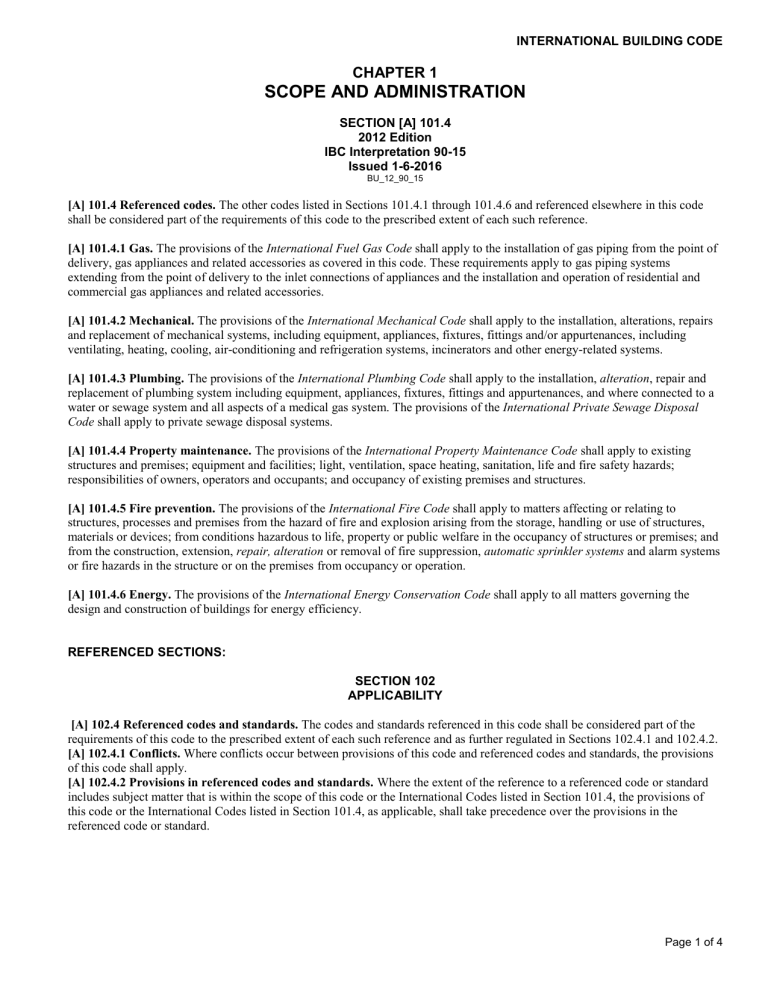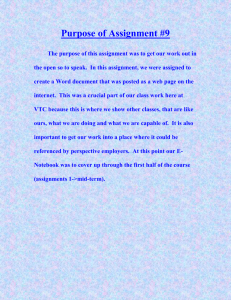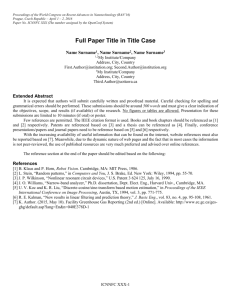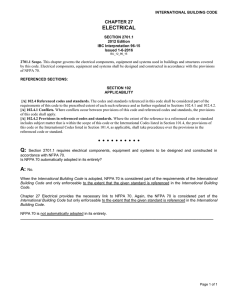101.4 Referenced codes - International Code Council

INTERNATIONAL BUILDING CODE
CHAPTER 1
SCOPE AND ADMINISTRATION
SECTION [A] 101.4
2012 Edition
IBC Interpretation 90-15
Issued 1-6-2016
BU_12_90_15
[A] 101.4 Referenced codes. The other codes listed in Sections 101.4.1 through 101.4.6 and referenced elsewhere in this code shall be considered part of the requirements of this code to the prescribed extent of each such reference.
[A] 101.4.1 Gas. The provisions of the International Fuel Gas Code shall apply to the installation of gas piping from the point of delivery, gas appliances and related accessories as covered in this code. These requirements apply to gas piping systems extending from the point of delivery to the inlet connections of appliances and the installation and operation of residential and commercial gas appliances and related accessories.
[A] 101.4.2 Mechanical. The provisions of the International Mechanical Code shall apply to the installation, alterations, repairs and replacement of mechanical systems, including equipment, appliances, fixtures, fittings and/or appurtenances, including ventilating, heating, cooling, air-conditioning and refrigeration systems, incinerators and other energy-related systems.
[A] 101.4.3 Plumbing. The provisions of the International Plumbing Code shall apply to the installation, alteration , repair and replacement of plumbing system including equipment, appliances, fixtures, fittings and appurtenances, and where connected to a water or sewage system and all aspects of a medical gas system. The provisions of the International Private Sewage Disposal
Code shall apply to private sewage disposal systems.
[A] 101.4.4 Property maintenance. The provisions of the International Property Maintenance Code shall apply to existing structures and premises; equipment and facilities; light, ventilation, space heating, sanitation, life and fire safety hazards; responsibilities of owners, operators and occupants; and occupancy of existing premises and structures.
[A] 101.4.5 Fire prevention. The provisions of the International Fire Code shall apply to matters affecting or relating to structures, processes and premises from the hazard of fire and explosion arising from the storage, handling or use of structures, materials or devices; from conditions hazardous to life, property or public welfare in the occupancy of structures or premises; and from the construction, extension, repair, alteration or removal of fire suppression, automatic sprinkler systems and alarm systems or fire hazards in the structure or on the premises from occupancy or operation.
[A] 101.4.6 Energy. The provisions of the International Energy Conservation Code shall apply to all matters governing the design and construction of buildings for energy efficiency.
REFERENCED SECTIONS:
SECTION 102
APPLICABILITY
[A] 102.4 Referenced codes and standards. The codes and standards referenced in this code shall be considered part of the requirements of this code to the prescribed extent of each such reference and as further regulated in Sections 102.4.1 and 102.4.2.
[A] 102.4.1 Conflicts. Where conflicts occur between provisions of this code and referenced codes and standards, the provisions of this code shall apply.
[A] 102.4.2 Provisions in referenced codes and standards. Where the extent of the reference to a referenced code or standard includes subject matter that is within the scope of this code or the International Codes listed in Section 101.4, the provisions of this code or the International Codes listed in Section 101.4, as applicable, shall take precedence over the provisions in the referenced code or standard.
Page 1 of 4
INTERNATIONAL BUILDING CODE
CHAPTER 13
ENERGY EFFICIENCY
SECTION 1301
GENERAL
[E] 1301.1 Scope. This chapter governs the design and construction of buildings for energy efficiency.
[E] 1301.1.1 Criteria. Buildings shall be designed and constructed in accordance with the International Energy Conservation
Code .
CHAPTER 28
MECHANICAL SYSTEMS
SECTION 2801
GENERAL
[M] 2801.1 Scope. Mechanical appliances, equipment and systems shall be constructed, installed and maintained in accordance with the International Mechanical Code and the International Fuel Gas Code . Masonry chimneys, fireplaces and barbecues shall comply with the International Mechanical Code and Chapter 21 of this code.
CHAPTER 29
PLUMBING SYSTEMS
SECTION 2901
GENERAL
[P] 2901.1 Scope. The provisions of this chapter and the International Plumbing Code shall govern the erection, installation, alteration , repairs, relocation, replacement, addition to, use or maintenance of plumbing equipment and systems.
Toilet and bathing rooms shall be constructed in accordance with Section 1210. Plumbing systems and equipment shall be constructed, installed and maintained in accordance with the International Plumbing Code . Private sewage disposal systems shall conform to the International Private Sewage Disposal Code .
● ● ● ● ● ● ● ● ● ●
Q1:
The codes listed in Sections 101.4.1 through 101.4.6 and referenced elsewhere in the code shall be considered part of the requirements of this code to the prescribed extent of each such reference.
Section 101.4.1 lists all of the applications that are regulated by the International Fuel Gas Code .
Section 101.4.2 lists all of the applications that are regulated by the International Mechanical Code .
Are the International Fuel Gas Code and International Mechanical Code automatically adopted?
A1:
No.
When the International Building Code is adopted, the specific International Codes referenced in Sections 101.4.1 and
101.4.2 are considered part of the requirements of the International Building Code but only enforceable to the extent that the given code is referenced in the International Building Code .
Chapter 28 Mechanical Systems provides the necessary link to the International Fuel Gas Code and International
Mechanical Code . Again, the International Fuel Gas Code and International Mechanical Code are considered part of the requirements of the International Building Code but only enforceable to the extent that the given code is referenced in the International Building Code .
Example 1: Section 2113.11.1.2 in the International Building Code references the International Fuel Gas Code regarding flue lining systems for gas appliances. The specific sections of the International Fuel Gas Code that addresses flue lining systems for gas appliances are deemed to be adopted and enforceable, but any other requirements in the International Fuel Gas Code not specifically referenced in the International Building Code are not adopted and are not enforceable.
Example 2: Section 904.2.1 in the International Building Code references the International Mechanical Code regarding commercial hoods and duct systems. The specific sections of the International Mechanical Code that addresses commercial hoods and duct systems are deemed to be adopted and enforceable, but any other requirements in International Mechanical Code not specifically referenced in the International Building Code are not adopted and are not enforceable.
The International Fuel Gas Code and International Mechanical Code are not automatically adopted in their entirety.
Q2:
The codes listed in Sections 101.4.1 through 101.4.6 and referenced elsewhere in the code shall be considered
Page 2 of 4
INTERNATIONAL BUILDING CODE part of the requirements of this code to the prescribed extent of each such reference.
Section 101.4.3 lists all of the applications that are regulated by the International Plumbing Code .
Section 101.4.3 references the International Private Sewage Disposal Code for private sewage disposal systems.
Are the International Plumbing Code and the International Private Sewage Disposal Code automatically adopted in its entirety?
A2:
No.
When the International Building Code is adopted, the specific International Codes referenced in Section 101.4.3 are considered part of the requirements of the International Building Code but only enforceable to the extent that the given code is referenced in the International Building Code .
Chapter 29 Plumbing Systems provides the necessary link to the International Plumbing Code and International
Private Sewage Disposal Code . Again, the International Plumbing Code and International Private Sewage Disposal
Code are considered part of the requirements of the International Building Code but only enforceable to the extent that the given code is referenced in the International Building Code .
Example 1: Section 903.3.5 in the International Building Code references the International Plumbing Code regarding the protection of the potable water supply for automatic sprinkler systems. The specific sections of the International Plumbing Code that addresses the protection of the potable water supply for automatic sprinkler systems are deemed to be adopted and enforceable, but any other requirements in the International Plumbing not specifically referenced in the International Building Code are not adopted and are not enforceable.
Example 2: Section 3401.3 in the International Building Code references the International Private Sewage Disposal Code regarding alterations, repairs, additions and changes of occupancy to, or relocation of, existing buildings. The specific sections of the International Private Sewage Disposal Code that addresses alterations, repairs, additions and changes of occupancy to, or relocation of, existing buildings are deemed to be adopted and enforceable, but any other requirements in International Private
Sewage Disposal Code not specifically referenced in the International Building Code are not adopted and are not enforceable.
The International Plumbing Code and International Private Sewage Disposal Code are not automatically adopted in their entirety.
Q3:
The codes listed in Sections 101.4.1 through 101.4.6 and referenced elsewhere in the code shall be considered part of the requirements of this code to the prescribed extent of each such reference.
Section 101.4.4 lists all of the applications that are regulated by the International Property Maintenance Code .
Is the International Property Maintenance Code automatically adopted in its entirety?
A3:
No.
When the International Building Code is adopted, the specific International Code referenced in Section 101.4.4 is considered part of the requirements of the code but only enforceable to the extent that the given code is referenced in the International Building Code .
Example: Section 3401.3 in the International Building Code references the International Property Maintenance Code regarding alterations, repairs, additions and changes of occupancy to, or relocation of, existing buildings. The specific sections of the
International Private Sewage Disposal Code that addresses alterations, repairs, additions and changes of occupancy to, or relocation of, existing buildings are deemed to be adopted and enforceable, but any other requirements in International Property
Maintenance Code not specifically referenced in the International Building Code are not adopted and are not enforceable.
The International Property Maintenance Code is not automatically adopted in its entirety.
Q4:
The codes listed in Sections 101.4.1 through 101.4.6 and referenced elsewhere in the code shall be considered part of the requirements of this code to the prescribed extent of each such reference.
Section 101.4.5 lists all of the applications that are regulated by the International Fire Code .
Is the International Fire Code automatically adopted in its entirety?
A4:
No.
When the International Building Code is adopted, the specific International Code referenced in Section 101.4.5 is considered part of the requirements of the code but only enforceable to the extent that the given code is referenced in
Page 3 of 4
INTERNATIONAL BUILDING CODE the International Building Code .
Example 1: Section 903.5 in the International Building Code references the International Fire Code regarding the testing and maintenance of sprinkler systems. The specific sections of the International Fire Code that addresses the testing and maintenance of sprinkler systems are deemed to be adopted and enforceable, but any other requirements in the International Fire Code not specifically referenced in the International Building Code are not adopted and are not enforceable.
Example 2: Section 3401.3 in the International Building Code references the International Fire Code regarding alterations, repairs, additions and changes of occupancy to, or relocation of, existing buildings. The specific sections of the International Private
Sewage Disposal Code that addresses alterations, repairs, additions and changes of occupancy to, or relocation of, existing buildings are deemed to be adopted and enforceable, but any other requirements in International Fire Code not specifically referenced in the International Building Code are not adopted and are not enforceable.
The International Fire Code is not automatically adopted in its entirety.
Q5:
The codes listed in Sections 101.4.1 through 101.4.6 and referenced elsewhere in the code shall be considered part of the requirements of this code to the prescribed extent of each such reference.
Section 101.4.6 lists all of the applications that are regulated by the International Energy Conservation Code .
Is the International Energy Conservation Code automatically adopted in its entirety?
A5:
No.
When the International Building Code is adopted, the specific International Codes referenced in Section 101.4.6 is considered part of the requirements of the International Building Code but only enforceable to the extent that the given code is referenced in the International Building Code .
Chapter 13 Energy Efficiency provides the necessary link to the International Energy Conversation Code . Again, the
International Energy Conversation Code is considered part of the International Building Code but only enforceable to the extent that the given code is referenced in the International Building Code .
Example 1: Section 1405.3 in the International Building Code references the International Energy Code regarding the selection of climate zones. The specific sections of the International Energy Code that climate zones are deemed to be adopted and enforceable, but any other requirements in the International Energy Code not specifically referenced in the International Building
Code are not adopted and are not enforceable.
Example 2: Section 1203.3.2 in the International Building Code references the International Mechanical Code regarding perimeter wall insulation and conditioning of the under-floor space. The specific sections of the International Energy Code that addresses perimeter wall insulation and conditioning of the under-floor space are deemed to be adopted and enforceable, but any other requirements in International Energy Code not specifically referenced in the International Building Code are not adopted and are not enforceable.
The International Energy Conservation Code is not automatically adopted in its entirety.
__________________________________________________________________________________________
Page 4 of 4



